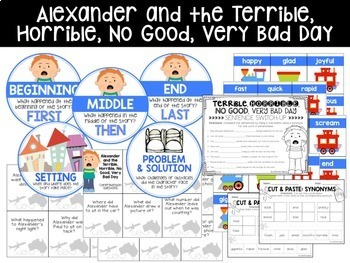
/2012/11/48/4/192/1922283/97bfb666651c18df_alexterribleday/i/Alexander-Terrible-Horrible-Good-Very-Bad-Day-Judith-Viorst.jpeg)
So if it's such a downer, why do people love the book so much? Is it just that misery loves company? Alexander, however, is the par excellence of negativity, the cynic's manifesto, the antiserum to the syrupy sweetnessthat so often prevails in children's media. Most children's literature-from ancient fairytales to contemporary picture books-bring a happy, pro-social, we're-all-friends kind of tone to the world. What is Alexander and the Terrible, Horrible, No Good, Very Bad Day About and Why Should I Care?ĭo you want your books to end with a happily ever after? Then Alexander isn't for you. If you want to know what people think it's like to be a kid, this is a great place to start. Viorst's version of childhood has leapt from print to stage to TV and now to the silver screen, and there's no end in sight.

The book is a must-read for kids and adults alike. Is being a kid fundamentally different than being an adult? When does childhood end? Are kids people, too? Thanks to lasting power of Judith Viorst's protagonist-hero of three other children's books- Alexander has become a strong representation of what our society thinks of when we think of childhood. Why? Because the concept of "childhood" is the center of some hot debate in some circles.

In this case, peer pressure is actually a valuable thing. Alexander: educational for the kids and fun for the adults.īut who cares about 28 little pages in the long run? Turns out, lots and lots of people. At the same time, Alexander provides a perfect mirror for the little tykes who see the world the same way he does. But Viorst's rambling, cynical hero reveals the humor in the tantrumy melodrama of childhood bad moods. No parent or teacher wants to shell out for a book that it is a nightmare to read. Whatever the reason, Alexander is one of those books that strikes a (minor) chord.Ĭhildren's literature is a really tricky thing to sell because it actually has a dual audience: the kids who are supposed to love it and the adults who are supposed to buy it. Maybe it's Alexander's lovable crabbiness, maybe it's the fact that kids and adults can empathize with his plight, maybe it's just one big pity party. Judith Viorst wrote Alexander back in 1972, and it's been a centerpiece of children's literature ever since. (You're welcome.) The book has remained in our hearts and on our children's bookshelves for over four decades.

But we do know that it will help you use Alexander and the Terrible, Horrible, No Good, Very Bad Day as an amazing teaching tool for everything from emotional understanding to problem-solving to why they should clean their room. We don't expect your four-year-old to be reading through this whole guide.


 0 kommentar(er)
0 kommentar(er)
